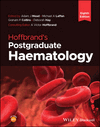Obstetric haematology
Gillian Swallow
Consultant Haematologist, Oxford University Hospitals NHSFT, UK
Search for more papers by this authorSue Pavord
Consultant Haematologist, Oxford University Hospitals NHSFT, UK
Search for more papers by this authorGillian Swallow
Consultant Haematologist, Oxford University Hospitals NHSFT, UK
Search for more papers by this authorSue Pavord
Consultant Haematologist, Oxford University Hospitals NHSFT, UK
Search for more papers by this authorAdam J Mead PhD, FRCP, FRCPath, FMedSci
Haematopoietic Stem Cell Biology Laboratory, Medical Research Council Molecular Haematology Unit, Medical Research Council Weatherall Institute of Molecular Medicine, University of Oxford, Oxford, UK
Search for more papers by this authorMichael A Laffan DM, MRCP, FRCPath
Department of Immunology and Inflammation, Faculty of Medicine, Imperial College London, London, UK
Search for more papers by this authorGraham P Collins DPhil, FRCP, FRCPath
Department of Haematology, Oxford Cancer and Haematology Centre, Oxford, UK
Search for more papers by this authorDeborah Hay DPhil, MRCP, FRCPath
Nuffield Division of Clinical Laboratory Sciences, Radcliffe Department of Medicine, University of Oxford, Oxford, UK
Search for more papers by this authorA Victor Hoffbrand MA, DM, FRCP, FRCPath, FRCP (Edin), DSc, FMedSci
Emeritus Professor of Haematology Honorary Consultant Haematologist
University College London, London, UK
Royal Free Hospital, London, UK
Search for more papers by this authorSummary
Obstetric Haematology concerns the care of women before, during and after pregnancy with primary or secondary haematological disease. This is a high-stakes area of medicine where careful planning involving the multidisciplinary team and attention to detail can make the difference between life and death of a young woman and/or her baby. Normal pregnancy is associated with substantial physiological changes to meet the needs of the developing foetus but these changes, particularly if unbalanced, can themselves lead to complications. For example, the massive increase in uterine blood flow and vascular compliance necessary to maintain blood supply to the foetus can lead to significant haemorrhage at the time of placental separation. Changes in coagulation factors help to mitigate this risk but increase the potential for systemic thromboembolic events. The increased demand for iron and other nutrients by the growing foetus frequently results in maternal deficiencies and close proximity of the foetal and maternal circulations enables an effective transfer of nutrients and oxygen but exposes the mother to foetal antigenic material with potential alloimmune sensitization. Although most pregnancies progress without problem, knowledge and awareness in this field of medicine are critical to prevent avoidable complications.
Selected bibliography
- Bauer ME , Arendt K , Beilin Y et al . ( 2021 ) The society for obstetric anaesthesia and perinatology interdisciplinary consensus statement on neuraxial procedures in obstetric patients with thrombocytopenia . Anesthesia & Analgesia 132 : 1531 – 44 .
- Chakravarty EF , Murray ER , Kelman A et al . ( 2011 ) Pregnancy outcomes after maternal exposure to rituximab . Blood 117 : 1499 – 1506 .
- Kyei-Mensah AAA , Davis B , Gupta M. ( 2014 ) Management of Beta thalassaemia in pregnancy. Green-top Guideline No. 66 . British Journal of Obstetrics and Gynaecology 16 : 148 .
- Oteng-Ntim E , Pavord S , Howard R et al . ( 2021 ) Management of sickle cell disease in pregnancy. A british society for haematology guideline . British Journal of Haematology 194 : 980 – 95 .
- Pavord S , Maybury H ( 2015 ) How I treat postpartum hemorrhage . Blood 125 ( 18 ): 2759 – 70 .
- Pavord S , Rayment R , Madan B et al . ( 2017 ) Management of inherited bleeding disorders in pregnancy. Green-top Guideline No. 71 . British Journal of Obstetrics and Gynaecology 124 : e194 – 263 .
- Pavord S , Daru J , Prasannan N et al . ( 2020 ) UK guidelines on the management of iron deficiency in pregnancy . British Journal of Haematology 188 : 819 – 30 .
- Provan D , Arnold D , Bussel J ( 2019 ) Updated international consensus report on the investigation and management of primary immune thrombocytopenia . Blood Advances 3 : 3780 – 817 .
- Royal College of Obstetricians and Gynaecologists Greentop guideline 37a: Reducing the risk of thrombosis and embolism during pregnancy and the puerperium RCOG 2015 .
- Regan F , Lees CC , Jones B , Royal College of Obstetricians and Gynaecologists ( 2019 ) Prenatal management of pregnancies at risk of fetal neonatal alloimmune thrombocytopenia (FNAIT): Scientific Impact Paper No. 61 British Journal of Obstetrics and Gynaecology 126 : e173 – 185 .
- Thomson AJ Greer IA ( 2015 ) Thromboembolic disease in pregnancy and the puerperium: acute management. Green top Guideline No 37b .
- White J , Qureshi H , Massey E et al . ( 2016 ) Guideline for blood grouping and red cell antibody testing in pregnancy . Transfusion Medicine 26 : 246 – 263 .



